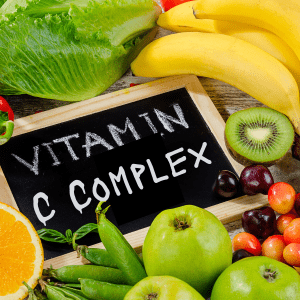What is Vitamin C Complex?
We’ve all heard of Vitamin C, and mainly think of it for your immune system, to avoid a cold or help you get over a cold more quickly.
Maybe you remember this from history class: Back when settlers were sailing to the Americas, they would get scurvy. It was from lack of the foods that have Vitamin C. (Do you think they thought it was catching? But it was really from the food?) Yes, you can get scurvy today simply by eating a diet mainly of processed foods or if your digestive system is not absorbing well- but that rarely happens.
Symptoms you might have showing low Vitamin C, outside of just getting sick:
- tired and weak,
- irritable,
- muscle and joint pain,
- especially in the legs and arms,
- swollen or bleeding gums (usually one of the first signs when brushing gently),
- small red or purple spots on the skin,
- dry or rough skin.
- anemia (most often caused by low Vitamin B12 or Iron),
- swollen joints,
- loose teeth
- bruise easily.
Vitamin C is not best on its own, which is why taking a Vitamin C Complex is important. I’ll explain.
Some Vitamin C supplements still have just Vitamin C and not the complex. The scientific name for vitamin C in supplements is ascorbic acid.
Like all vitamins, Vitamin C is never found alone in nature. It is part of a complex of nutrients that work together. Think of trying to steer your car but the steering wheel (Vitamin C) isn’t attached to the wheels (the complex part of Vitamin C complex). It doesn’t work well. T
So, if you’ve been taking synthetic vitamin C (ascorbic acid), you might be missing out on the full benefits of what it can do for you.
What is C Complex, then?
Vitamin C Complex includes:
- Ascorbic Acid: This is the Vitamin C and protects against free radicals. (Free radicals cause cell damage.)
- Bioflavonoids (rutin, quercetin, hesperidin): These support vitamin C (and in the steering wheel analogy, would be the parts that attach to the wheels)
- Tyrosinase (copper enzyme): critical for collagen production and immune function. (Wheels in our example)
- Cofactors (ascorbigen, enzymes, and synergists): Help your body use vitamin C. (Wheels in our example)
The steering wheel example isn’t perfect, but it is just there to help get the point across. Because, in reality, your body will find those other nutrients from within your body so it can use the Vitamin C. This means your body is pulling from its own stores. WHich can cause a deficiency in any of the other nutrients above- and those will cause their own problems.
Back when I first learned about this some 20 years ago, science was only aware of bioflavinoids. It was Vitamin C with Bioflavinoids. They didn’t have Vitamin C Complex.
Over time, science is catching up with nature. But do they know everything yet?
When you take just isolated ascorbic acid, you’re missing the full complex. If you are taking the complex, history being a guide – you are still likely missing something. And your body has to pull nutrients from its own stores to make up for it. That’s why whole-food sources and full-spectrum supplements are better than straight-up Vitamin C and why whole food sources are better than full spectrum.
What is Whole-Food Vitamin C Complex?
Whole-food vitamin C comes directly from nature, meaning it’s derived entirely from fruits, vegetables, and other plant sources. Nothing synthetic is added or isolated.
Key Features of Whole-Food Vitamin C:
✔ Contains the entire C Complex directly from food, including ascorbic acid, bioflavonoids, rutin, tyrosinase, and essential cofactors. And because it is whole food, it will also include that-which-has-yet-to-be-discovered
✔ Naturally balanced just as your body recognizes it in food.
✔ Doesn’t require your body to pull from its own nutrient stores for activation (including the nutrients that haven’t been identified yet)
✔ Supports immune health, vascular integrity, collagen production, and stress response—the way nature intended.
🎉 No synthetics, no isolates, and no chemical additives.
Best Example: Doctor’s Research Whole Food C Complex: made entirely from food sources like acerola cherry and citrus bioflavonoids.
What is Full-Spectrum Vitamin C?
“Full spectrum” sounds good, but it often isn’t truly whole food. It refers to a formula that includes isolated ascorbic acid plus added bioflavonoids and other nutrients to mimic the full C Complex.
Key Features of Full-Spectrum Vitamin C:
✔ Contains isolated ascorbic acid plus added flavonoids and cofactors.
✔ Can be made from synthetic or natural sources.
✔ Often marketed as “better absorbed” because of added components.
⚠️ But here’s the problem:
- Your body treats isolated ascorbic acid as a drug, not a nutrient.
- Isolated ascorbic acid can create imbalances, even with the added spectrum of nutrients. This requires your body to pull from its own stores of bioflavonoids, copper, and other nutrients to make it work.
- Over time, taking high doses of synthetic ascorbic acid can deplete bioflavonoids and minerals, weakening vascular health.
Example: Some Standard Process products fall into this category; they combine whole-food extracts with isolated ascorbic acid, making them “full spectrum” but not 100% whole food. Standard Process is still the best Full Spectrum, as it also includes some of the whole food components.
Whole Food is Like a Super-charged Complex
1️⃣ Your Body Recognizes Whole Food
2️⃣ No Nutrient Depletion.
3️⃣ Better for Blood Vessels & Collagen.
4️⃣ No Synthetic Ingredients:
Which Should You Choose?
Doctor’s Research Whole Food C Complex
✔ 100% food-based: No synthetics.
✔ Made with acerola cherry, citrus bioflavonoids, and rutin.
✔ Supports immune health, collagen production, and vascular integrity.
✔ Designed for optimal absorption and utilization.
Best For: Anyone looking for a completely whole-food vitamin C supplement that actually works with your body. Works with immune support, stress response, wound healing, varicose veins or circulation issues.
Standard Process C Complex Supplements
Option 1: Cataplex C
✔ Provides whole-food vitamin C and bioflavonoids.
✔ Supports immune function and stress resilience.
✔ Aids in collagen formation and blood vessel integrity.
Best For: General immune support, stress response, and wound healing.
Option 2: Cyruta Plus
✔ Contains buckwheat-derived bioflavonoids (rutin, quercetin).
✔ Strengthens capillaries and circulation.
✔ Helps reduce bruising and vascular fragility.
Best For: Vascular concerns, bruising, varicose veins, or circulation issues.
Let me know if this helped or if you have more questions.
 Dr. Bonnie
Dr. Bonnie
References
Axe, J. (2023). Flavonoids and bioflavonoids benefits, best sources, side effects. Dr. Axe.
Fetcho Family Chiropractic. (n.d.). Nutritional essentials.
Healthline. (2024). The potential health benefits of rutin. Healthline.
Kraft Chiropractic. (n.d.). Standard Process/Mediherb.
Life Extension. (2012). How bioflavonoids nourish skin cells. Life Extension Magazine.
Planetary Herbals. (n.d.). Vitamin C as nature provides. Planetary Herbals.
Prairie Naturopathic Doctors. (2023). Vitamin C for better health. Prairie Naturopathic Doctors.
Standard Process. (n.d.-a). Cataplex® C. Standard Process.
Standard Process. (n.d.-b). Cyruta® Plus. Standard Process.
Triquetra Health. (n.d.). Organic vitamin C | Whole food vitamin C from fruit plus absorption enhancing cofactors. Amazon.
Whole Food Remedies. (n.d.). Benefits of acerola vitamin C. Whole Food Remedies.

